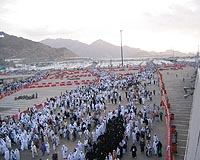| . |  |
. |
Johannesburg (AFP) Aug 18, 2009 Poverty, disease and overburdened health systems make Africa an easy target for swine flu, which health experts say will be difficult to track as it spreads across the continent. Africa is the last continent to be hit by the A(H1N1) influenza virus which has killed over a thousand people around the world, since it was first detected in April in Mexico. So far the continent's death toll remains small, with six killed in South Africa, three in Mauritius, and one in Egypt. Botswana, Gabon, Kenya, Madagascar, Namibia and Swaziland also have confirmed cases, but experts say the disease could be spreading undetected in more countries, due to a lack of medical facilities across the continent. "The impact of the current pandemic will be obscured by under or lack of reporting," said Ed Rybicki, a virologist at the University of Cape Town. Many African countries are already affected by immune-weakening illnesses like AIDS, making them more susceptible to new viruses. "Malnutrition and other diseases of poverty mean that infected people have a worse prognosis for any kind of flu," said Rybicki. The world's poorest continent also lacks the money to effectively combat the disease. World Health Organisation regional director Luis Gomes Sambo warned last week that the agency had a 31 million dollar shortfall in its African response plan. "So far only 700,000 dollars has been made available and it will be difficult to shift funds already earmarked for other public health programmes," Sambo said. The WHO has set up a crisis management team in Brazzaville to help countries monitor the disease and ensure cases are detected early. This team will have support centres in Zimbabwe, Gabon and Burkina Faso. Southern African countries have been referring suspected cases to a South African laboratory for testing, as many countries simply have no equipment to do the tests themselves. Sambo said the sub-Saharan region is prone to recurrent epidemics such as hemorrhagic fevers, meningitis and water-borne diseases, making it an easy target for new infections. "Sub-Saharan Africa is hosting 66 percent of the total burden of HIV/AIDS pandemic, 31 percent of tuberculosis and 86 percent of the total burden of malaria," Sambo told a regional conference on the pandemic. In South Africa, panic-stricken parents have taken their children out of school, with some being sent into classrooms in medical masks. "So far we believe that the containment of the influenza spread world-over, through measures such as closing down schools, has not proven to be a success anywhere," the health ministry said. The South African National Institute for Communicable Diseases and health department have launched a call centre where the public can register their concerns. Since the first death was registered two weeks ago, South Africans have flocked to health centres around the country seeking anti-viral medications. "Right now we do not have a vaccine, people are advised against taking any form of medication without being sick," said the institute's spokeswoman Lucille Blumberg. Share This Article With Planet Earth
Related Links Epidemics on Earth - Bird Flu, HIV/AIDS, Ebola
 Muslim pilgrims turned away at Cairo airport amid flu ban
Muslim pilgrims turned away at Cairo airport amid flu banCairo (AFP) Aug 17, 2009 Egypt on Monday prevented dozens of pilgrims over the age of 65 or under 25 from travelling to Mecca as part of measures to prevent the spread of swine flu, an airport official said. "Fifteen percent of passengers who arrived on Monday at Cairo airport to travel to Saudi Arabia on pilgrimage were prevented from leaving," the official said. He said the travel ban affected between 180-200 ... read more |
|
| The content herein, unless otherwise known to be public domain, are Copyright 1995-2009 - SpaceDaily. AFP and UPI Wire Stories are copyright Agence France-Presse and United Press International. ESA Portal Reports are copyright European Space Agency. All NASA sourced material is public domain. Additional copyrights may apply in whole or part to other bona fide parties. Advertising does not imply endorsement,agreement or approval of any opinions, statements or information provided by SpaceDaily on any Web page published or hosted by SpaceDaily. Privacy Statement |